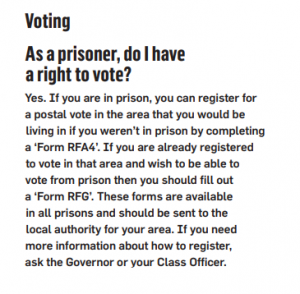Letter to Governors: Voting in prison
25th April 2024
Irish Penal Reform Trust (IPRT) has written to Prison Governors asking them to put in place measures to support voter registration and facilitate voting in each prison ahead of the upcoming local and European elections on 7 June 2024.
IPRT is keenly aware that there is a part of society in the custody and care of Governors and the Irish Prison Service (IPS) that has the right to vote in these upcoming elections. Notably, you do not have to be an Irish citizen to vote in a local election but instead, be ordinarily resident in the State to register on the Register of Electors. Also, any EU citizens under your care should be entitled to vote in the European elections if they are registered.
IPRT wrote to prison governors to urge them to put in place measures to support voter registration and facilitate voting in prisons if they have not already done so. We know that a programme of work is required in order to enable civic engagement and to protect the right to vote. This important right should be facilitated and protected within the prison estate, just as it is in the rest of our community. However, for people in prison, the vindication of this right is largely reliant on pirson Governors, and the IPS.
The Electoral (Amendment) Act 2006 provides the legal basis for the enfranchisement of all individuals in the custody of the prison estate. In summary, voting can take place by postal vote within the prison, and no home address is needed for registration, but constituency registration is needed. Relevant forms must be made available in prisons to allow for individuals to register for a postal vote. People should also be facilitated in checking the electoral register to check that they are registered to vote. Governors will also need to confirm (section 3) that the person will be in prison on polling day and unable to vote in the community.
Applications for special and postal voting arrangements must be received by the local authority no later than 11 May 2024, which must also include the relevant, completed, certification.
IPRT's understanding is that often the first practical step that Goveronrs can undertake is to designate a PO(s) with the responsibility to provide information and the necessary support to individuals to complete this process of registering to vote and registering for a postal vote. In addition, IPRT understand that the school in the prison is often very helpful regarding the provision of information and in encouraging individuals to exercise their right to vote.
A perception of occasion could also be created by employing the same setup as exists in voting stations in the community on polling day (e.g., ballot boxes, the curtained station to vote with privacy) - for many, it might be the first time to register to vote and/or first time to vote.
IPRT also encourage Goveronors to facilitate political parties to distribute their party literature/manifestos in your prison through the school, library, and other common areas of the prison. IPRT has been speaking with a number of political representatives and candidates regarding prison voting, and they have indicated to us that they are willing to visit a prison in or near their constituency.
When the right to vote was facilitated and exercised for the first time by those in prisons in 2007 elections, research based on IPS information showed that 71.4% of eligible prisoners voted compared to 67% of registered voters (in the national population) – demonstrating that there is likely an equivalent enthusiasm and willingness to participate in the democratic process of voting, where it is made available. (Behan & O’Donnell, 2008)
In a broader context, it is a process of civic engagement that can have a broader positive impact on prison life, its culture and community. It can promote a sense of community and belonging among individuals – both inside prison and on release. If individuals are enfranchised, and feel supported and facilitated in exercising this right, it can lead to a sense of responsibility and engagement with their communities.
- For more information on voting prison: Electoral (Amendment) Act 2006 or read the Know Your Rights: Your Rights as a Prisoner.


Related items:
- Voting in Prison - National Voter Registration Day 2024
- Irish Times Opinion Piece: Prison voting essential to any democracy
- Penal Reform Trust welcomes Government decision on prisoner voting rights
- IPRT welcomes passage of Prisoner Voting Legislation
- European Court of Human Rights Decision Upholds Prisoner Voting Rights




